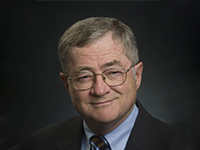Longtime otolaryngologist, Richard Waguespack, retires
By: Lindsey Evans
Published Date: Jul 06
 Richard Waguespack, MD, FACS, is retiring after 40 years of serving patients. Dr. Waguespack made the transition from private practice to academic medicine in 2013. He specialized in general otolaryngology, otology, and laryngology.
Richard Waguespack, MD, FACS, is retiring after 40 years of serving patients. Dr. Waguespack made the transition from private practice to academic medicine in 2013. He specialized in general otolaryngology, otology, and laryngology.